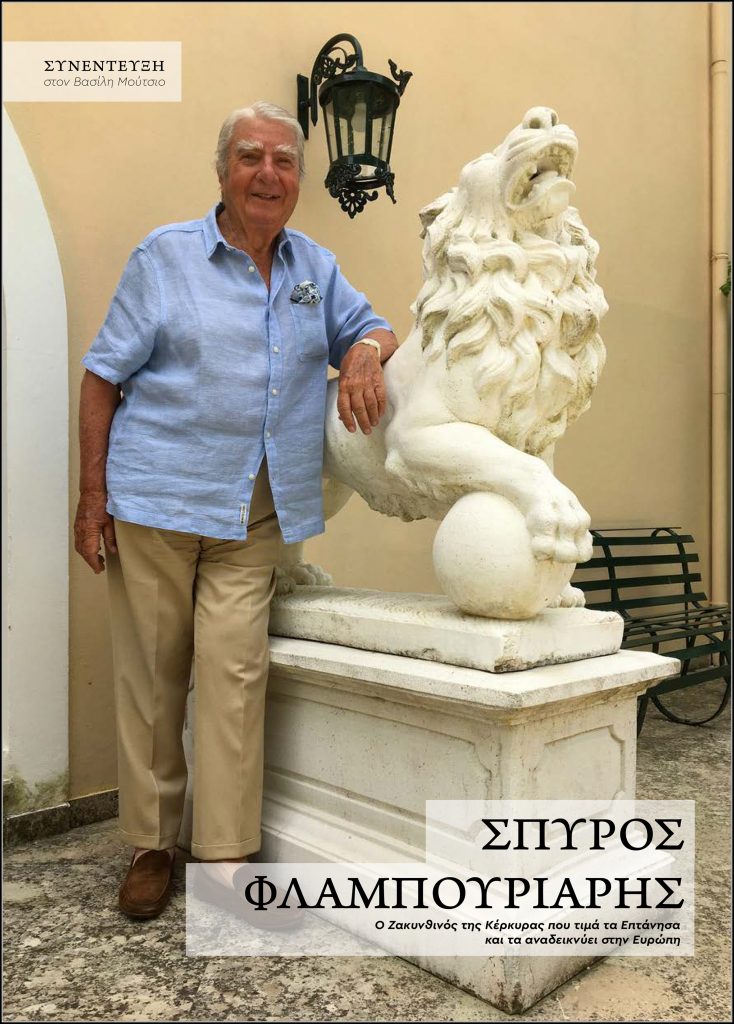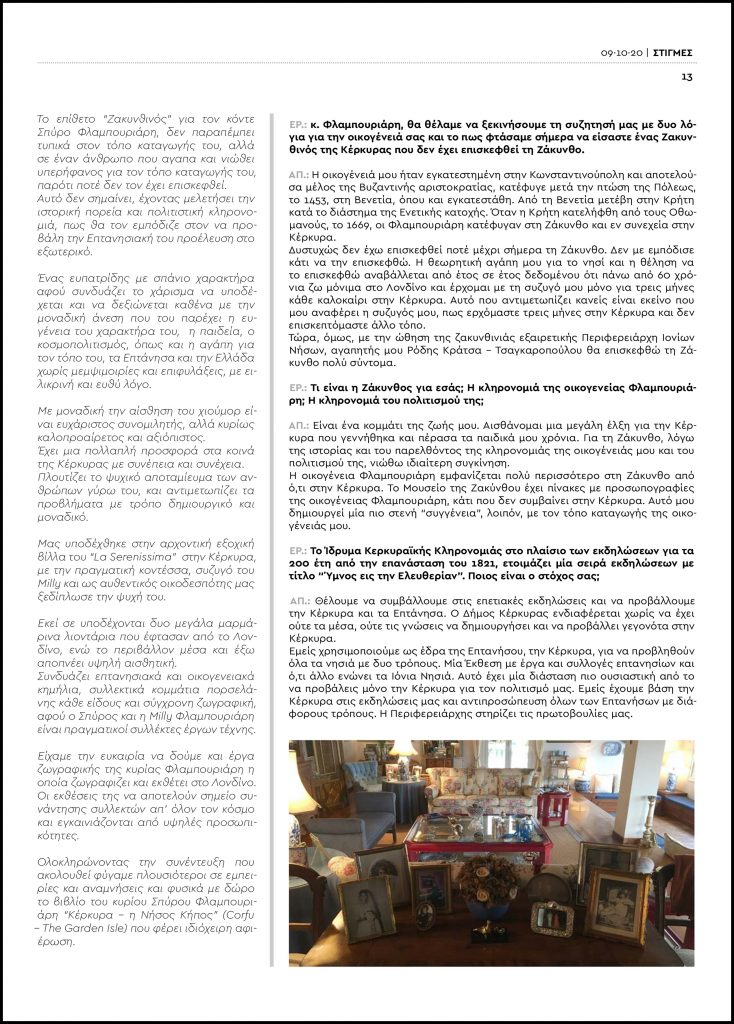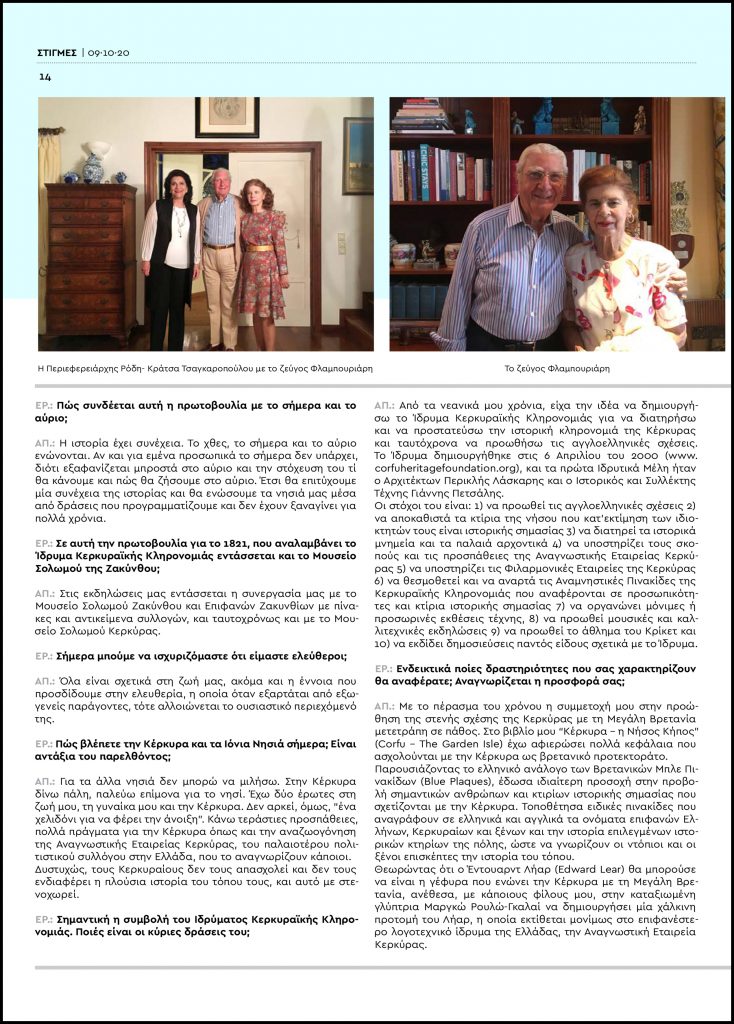Interview by Vasilis Moutsios
[English translation below the visuals]




Spiro Flamburiari: The Zakynthian of Corfu who honours the Ionian Islands and promotes them in Europe
Interviewed by Vasilis Moutsios
[“Stigmes” magazine in the “Day of Zakynthos” newspaper, 9 October 2020, pp. 12-15]
VM: Count Flamburiari, we would like to start our discussion with a few words about your family and how today is reached with you being a Zakynthian from Corfu who has not visited Zakynthos.
SF: My family settled in Constantinople and being a member of the Byzantine aristocracy, took refuge after the fall of the City, in 1453, in Venice, where it settled. From Venice it went to Crete during the Venetian occupation. When Crete was occupied by the Ottomans, in 1669, the Flamburiari fled to Zakynthos and then to Corfu.
Unfortunately, I have never visited Zakynthos until today. Nothing prevented me from visiting it. My theoretical love for the island and the desire to visit it is postponed from year to year since I have been living permanently in London for over 60 years and I come with my wife only for three months every summer in Corfu. What one is facing is what my wife tells me, that we are coming to Corfu for three months and we do not visit another place.
But now, with the impetus of the Zakynthian Regional Governor of the Ionian Islands, my dear Rodi Kratsa-Tsagaropoulou, I will visit Zakynthos very soon.
VM: What is Zakynthos for you? The legacy of the Flamburiari family? Their cultural heritage?
SF: It is a part of my life. I feel an attraction like for Corfu where I was born and spent my childhood. For Zakynthos, due to the history and the past of my family heritage and its culture, I feel a special emotion.
The Flamburiari family appears much more in Zakynthos than in Corfu. The Museum of Zakynthos (Museum of Solomos & Eminent Zakynthians) has many paintings with portraits of the Flamburiari family, something that does not happen in Corfu. This creates a closer “kinship” for me.
VM: The Corfu Heritage Foundation, in the context of the events for the 200 years since the Revolution of 1821, is preparing a series of events entitled “Hymn to Liberty”. What is your goal?
SF: The Municipality of Corfu is interested having neither the means nor the knowledge to promote events in Corfu.
We use Corfu as the seat of the Ionian Islands to promote all the islands in two ways. An Exhibition with works and collections of Heptanesians and everything else that unites the Ionian Islands. This has a more substantial dimension than just promoting Corfu. We are based in Corfu and represent all the Ionian Islands in various ways.
VM: How does this initiative relate to the present and the future?
SF: The story goes on. The past, the present and the future are joined. Although for me personally today does not exist, because it disappears in front of tomorrow and the focus of what we will do and how we will live tomorrow. Thus we will achieve a continuum and unite our islands through actions that we plan and have not been done for many years.
VM: Is the Museum of Solomos & Eminent Zakynthians part of this initiative for 1821, undertaken by the Corfu Heritage Foundation?
SF: Our events include our collaboration with the Museum of Solomos & Eminent Zakynthians with paintings and objects of collections, and at the same time with the Museum of Solomos of Corfu.
VM: Can we claim to be liberated today?
SF: Everything is relative in our life, even the meaning we give to liberty, which when it depends on external factors then its essential content is altered.
VM: How do you see Corfu and the Ionian Islands today? Are they worthy of the past?
SF: I cannot say about the other islands. In Corfu I am fighting, I am persistently fighting for the island. I have two loves in my life, my wife and Corfu. But “one swallow does not a summer make”. I make great efforts, many things for Corfu, such as the revitalisation of the Corfu Reading Society, the oldest cultural association in Greece, which some recognise.
Unfortunately, the people of Corfu do not care and are not interested in the rich history of their place, and this upsets me.
VM: The contribution of the Corfu Heritage Foundation is important. What are its main actions?
SF: From my youth, I had the idea to create the Corfu Heritage Foundation to preserve and protect the historical heritage of Corfu and at the same time to promote Anglo-Greek relations. The Foundation was established on April 6, 2000 (www.corfuheritagefoundation.org), and the first Founding Members were Pericles Lascaris, Architect, and Yannis Petsalis, Historian and Art Collector. The objects of the Corfu Heritage Foundation are: 1) to promote Anglo-Hellenic relations; 2) to restore the buildings in the island deemed by the Trustees to be of historical importance; 3) to preserve historical monuments and the grand old estates; 4) to support the objects and endeavours of the Corfu Reading Society; 5) to support the Brass Bands of Corfu; 6) to establish and erect the Corfu Heritage Plaques concerning personalities and buildings of historical significance; 7) to curate permanent or temporary exhibitions of art; 8) to promote musical and artistic events; 9) to promote the game of Cricket; and 10) to carry out publications of all kind relevant to the Foundation.
VM: Indicatively, what activities that characterise you would you mention? Is your offer recognised?
SF: Over time, my involvement in promoting Corfu’s close relationship with Great Britain turns into a passion. In my book “Corfu – The Garden Isle” (London: John Murray, 1994) I have dedicated many chapters dealing with the British protectorate.
Presenting the Hellenic equivalent of the British Blue Plaques, I paid special attention to the promotion of important people and buildings of historical importance related to Corfu. I placed special plaques that are inscribed in Greek and English with the names of prominent Hellenes, Corfiots and foreigners and the history of selected historic buildings in the town, so that local and foreign visitors may learn the history of the place.
Considering that Edward Lear could be the bridge that connects Corfu with Great Britain, I commissioned with some of my friends the acclaimed sculptor Margot Roulleau-Gallais to create a bronze bust of Lear, which is on display at the most prominent literary institution in Greece, the Corfu Reading Society.
In 2014, together with Derek Jones, I founded the Edward Lear Society (www.edwardlearsociety.org), with the aim of promoting knowledge and education and preserving and protecting all issues related to the heritage, writing, work and painting by Edward Lear.
In 2018, the Corfu Heritage Foundation organised a series of events to celebrate the bicentenary since the creation in Corfu and Malta of the Order of St Michael and St George. I am proud that one of my ancestors, Count Dionysio Flamburiari, was honoured with the insignia of the Order in 1857. We try to revitalise, preserve and promote the best of Corfu.
VM: Are there any difficulties in the work carried out by the Corfu Heritage Foundation?
SF: There are always difficulties. Particularly when I decided to copy from London and bring to Corfu the British Blue Plaques, I struggled for two years with the Municipality of Corfu to be granted permission of placing them gratis. The delay of the permission was attributed by the Municipality of Corfu to the fact that there were more important issues to be dealt with.
I am stubborn. I set goals and achieve them no matter how long I need to wait. So I do for seven years to place an Inscribed Memorial Obelisk at the new junction of the Corfu Port Authority to honour the 200 Corfiots who fought in 1716 against the Ottomans, where many of them lost their lives.
VM: What do Great Britain and London mean in your life?
SF: When you have lived in London for 60 years, it is your second home. It is a place that respects its history, and in which “yes” is accompanied by “please” and “no” by “thank you”. There you know where you stand and you feel satisfied as a person. All this is foreign to Corfu!
VM: What would you advise a young man who is now at the beginning of his career?
SF: To aim for consistency and continuity. Consistency in what one does, and continuity in the confidence one has in what one does.
[Translated by Megakles Rogakos, MA MA PhD]
The Flamburiari Family
The Flamburiari family having settled in Constantinople and being a member of the Byzantine aristocracy, took refuge after the fall of the city in 1453 in Venice, where they settled. From Venice the family moved to Crete during the Venetian occupation. When Crete was occupied by the Ottomans, in 1669, the Flamburiari fled to Zakynthos and then to Corfu.
Under the rule of Venice, the Flaburiari offered outstanding military services to the Republic. In return for the exceptional military offerings of Sior Giovanni Flamburiari, the Venetian Senate of the Most Serene, on the 1st of November 1768, conferred on him the title of Count with the right to bequeath it to his male descendants and to enroll him in the Libro d’Oro. He was also provided with large estates. The monastery of the Theotokos Anafonitria in Zakynthos was added to his property on the 25th of September 1784 as an honour.
The Flamburiari include important personalities who played a significant role in the history of Greece and especially against the strong Ottoman oppression. Anastasio Flamburiari (1774-1828) held various political positions during the period of the Republic of the Seven United Islands. As an ardent member of the Filiki Eteria, he offered money and great services to the national liberation struggle.
Dionysio Flamburiari (1810-1874) was appointed prosecutor of Zakynthos under the English Protection. However, because he signed a petition to King George IV of England to reform the oppressive constitution of Sir Thomas Maitland, he was deposed and exiled to Venice. When he returned, he was appointed prosecutor of Corfu and was elected Legislator and Speaker of the Ionian Parliament. On the 9th of July 1857 he was honoured with the Grand Cross of Saints Michael and George. In honour of this family a village, located 25 km north of the city of Ioannina, was named ‘Flamburari’.
The Flamburiari family is one of the rarest without further synonyms. Therefore, all individuals with this name are related in varying degrees by kinship. The family is related to the Capodistria, Giustiniani, Marmora, de la Porta, Ralli, Theotoki and Valaoriti.
[The text above is based on the entry for the Flamburiari family – Leonidas Ch. Zois, Dictionary of the History and Folklore of Zakynthos, Volume A’, Athens: National Printing Office, 1963, pp. 682-683]